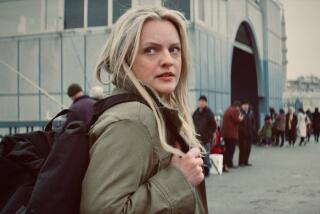Producers and cast of Jerusalem-set ‘Dig’ address Israel-Gaza crisis
Between “Homeland” and “Tyrant,” producer Gideon Raff has come to specialize in depicting the Middle East for American television audiences. Next up on his slate is “Dig,” a limited series for USA.
Set in Jerusalem and described as a “‘DaVinci Code’-like thriller,” it stars Anne Heche and Jason Isaacs and centers on a murder mystery that in turn uncovers a 2,000-year-old conspiracy.
The pilot was filmed on location but is currently on a production hiatus, with five remaining episodes yet to be shot. Given the escalating crisis in Israel, where air strikes on the Gaza Strip have killed at least 175 people, the possibility of relocating the production came up during a panel Monday at the Television Critics Assn. summer press tour.
Raff said the situation had caught them “off guard” and that the studio and network are weighing their options. “Hopefully, everything will calm down and we’ll go back to what we planned. And if not, we’ll sort it out, “ he continued. “But Jerusalem is a key element in our show.”
The spiraling violence could also potentially affect “Tyrant,” which premiered last month on FX and had been filiming in Tel Aviv.
When asked about his feelings on the situation, Raff, a Jerusalem native, chose his words carefully. “Our hearts go out to everybody in Israel and in Gaza over what’s happening right now,” he said. “And, hopefully, it will be resolved very soon. That’s what I can say about that.”
As for whether the series itself will engage with the region’s centuries-long history of religious conflict, cast and producers seemed reluctant to reveal too much in the way of plot details -- though as one reporter noted, a clip reel contained a shot of a red heifer, an animal that holds a special symbolic status in Jewish tradition.
“Clearly, we are lighting a fuse of a story and biblical prophecies that surround this murder mystery,” said show runner and executive producer Tim Kring. “So that is the world that it does swim in, yes, absolutely.”
Despite the mounting tension in the region, Jerusalem offered numerous upsides for the production, according to those involved.
“The ability to actually go someplace and set up a shot and point your camera in a direction and see the world was so fantastic,” said Kring. “And literally the number of extraordinary locations that have never been seen before on television, it was just a huge honor to be able to do that.”
It also proved inspiring to Isaacs, who likened the experience of driving to Jerusalem from Tel Aviv to “driving back through a rip in the fabric of time.”
“It’s not just that it’s gorgeous,” he said. “It’s that every civilization that there’s been — for thousands of years, every empire — has always wanted this tiny, tiny piece of land, this square mile. And when you’re shooting, as we did often, night shots and the sun comes up and starts glistening off the Dome of the Rock and you’re running on the rooftops or you’re emerging from a tunnel or a cave underneath it, and you can feel the combined history of these millions of people over the years.”
Twitter: @MeredithBlake
More to Read
The complete guide to home viewing
Get Screen Gab for everything about the TV shows and streaming movies everyone’s talking about.
You may occasionally receive promotional content from the Los Angeles Times.






